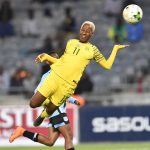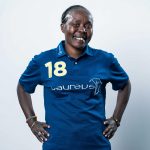Alphonso Davies and the refugee all-stars
The Bayern Munich winger started playing football in a refugee camp in Ghana before honing his skills in Canada. He’s a credit to the country that offered him asylum, and to all children of war.
Author:
11 March 2020

Bayern Munich’s Alphonso Davies is not your average freak of football nature. First of all, he is from Canada, a country that has produced its fair share of creative giants – Neil Young, Joni Mitchell, Jim Carrey – but none of them footballers. For context, Owen Hargreaves is arguably Canada’s finest player.
Until now, that is. And the rarity of Davies goes well beyond the coincidence of his Canadianness and his exceptional control of a football. Because before he was from Canada, he was from Ghana, and also from Liberia and also from nowhere. He was born in Buduburam, a sprawling refugee camp on the outskirts of Accra in Ghana that housed 50 000 refugees from the Liberian civil war.
Buduburam is now an established town, but when Davies spent the first five years of his life there, it was still a chaotic and desperate slum. He and his parents, Debeah and Victoria Davies, lived in a tiny chipboard shack, complete with chicken-wire windows. There was nothing for a toddler like Alphonso to do inside the shack. But he could play football outside it.
For Debeah and Victoria, the hardship of refugee life in Ghana was nothing compared to their traumatic memories of the killing fields of Liberia.
Related article:
When Davies was five years old, Canada came calling. His parents had secured asylum in Edmonton, Alberta, a wealthy city deep in the shale gas belt of Canada’s western interior. Edmonton was far from Buduburam, geographically and culturally. But football was still football, and Alphonso carried on playing it. A teacher at his Catholic junior school in Edmonton saw him dominate in playground kickabouts and enrolled him in a free-of-charge, inner-city league.
Then youth coach after coach passed him up the development ladder, propelling him on to bigger stages than each could provide, until he entered the Vancouver Whitecaps youth system and broke into the senior side of Whitecaps FC 2, which competed in the second-tier USL Championship league in the United States, at the age of 15.
A star is born
Vancouver football writer Mark Dailey remembers being shocked at his ability. “I remember watching him play against LA Galaxy 2 in May or June of 2016, and he’d already played a couple of senior games. Athletically and mentally, he was clearly something special, and scored his first senior goal. That summer, he joined the MLS [Major League Soccer] side, and they played a friendly against Crystal Palace who were on an off-season tour, and Davies played. We in the press scrum saw the Palace coach Alan Pardew going into the Whitecaps dressing room after the game, and we were all joking that he was offering 500 grand for Alphonso.”
Pardew should have made that offer. Just two years later, Bayern Munich stumped up $14 million (about R185 million at the time) for Davies, and on the evidence of his sparkling performances at leftback this season, that was a bargain price. In the first leg of Bayern’s Uefa Champions League clash with Tottenham Hotspur, Davies won all his tackles, provided an assist for Robert Lewandowski, registered a 91% pass accuracy, won the ball eight times and successfully took on an opponent in six of his seven attempts.
Related article:
Davies’ suite of qualities looks frighteningly complete: extreme pace, fine close control, brutal work rate, bulletproof defensive technique and mature decision-making in the final third. His main shortcoming is a lack of marketable egotism, says Dailey.
He’s now a cult hero in his hometown, but he recently attended a Vancouver Canucks ice hockey game down in the grandstand with the hoi-polloi, rather than in an executive box. And when he sent a Bayern shirt home to his father, the name on the back was Robben, not Davies. “Arjen has scored more goals,” joked Davies Jr, by way of explanation. On social media, he does a nifty line in video impressions of his Bayern teammates’ goal celebrations.
For a South African football fan, it’s a little galling to see a Canadian player reaching the pinnacle of the game so quickly. Our finest current export, Percy Tau, is perhaps no less talented, but the scale and speed of his impact in Europe is simply not comparable. The implication is that even Canada’s youth development system is a more balanced and reliable pipeline than ours. If a seven-year-old Davies was to find himself in a South African inner-city school, would he be promoted and supported and prepared as diligently as he was in Edmonton and Vancouver? Don’t bet on it.

What Canada is doing right
“The number of Canadians playing soccer at a recreational level is, I think, double the number who are playing ice hockey, which is kind of counterintuitive,” says Dailey. And the excellence of the women’s game in Canada is providing a foundation for the growth of the men’s side, he says – for example, the former women’s national coach John Herdman has taken over the men’s team.
Another factor in Canada’s growth is the slow but steady improvement of the MLS, in which the three biggest Canadian sides participate. While the league’s marquee acquisitions such as Zlatan Ibrahimovic and Wayne Rooney have added flashes of grizzled glamour, the general rise in standards has more to do with the stability of a financially sound league in which most salaries are capped and broadcast profits are evenly shared.
Related article:
“The three Canadian MLS sides are investing a lot in their youth systems, for example, and the Whitecaps run academies all across the country,” says Dailey. “It’s almost been a bit too successful for the Whitecaps. They now produce too many good players to field in the professional side.”
The Canadian Premier League launched last year, the first national professional league to exist since the 1990s, partly to absorb the surplus talent.
But as any sociologist or economist will tell you, the best thing you can do for any given society is to inject people from elsewhere. And the sheer volume and variety of immigration to Canada has expanded and enriched the football talent base and audience. About 300 000 newcomers settle in the country each year, often bringing a passion for football with them – whether they hail from Mexico City or Seoul or Buduburam.
The secret sauce
Part of Davies’ brilliance is also, surely, the secret sauce of refugee courage. It’s so often the case that the gifted children of refugees – and gifted children who were refugees themselves – grow up in a powerfully dual identity, as insiders (compared to their parents) and outsiders (compared to their peers, especially when black in a largely white society). Hence they do things differently: they think big, they work harder, they thrive on the defiance of expectations and they bring with them the electricity of the world they left behind. Without the security of social capital to fall back on, this group of refugees live and work without equivocation or complacency. (Not all refugees, of course. Plenty fall into alienated despair or withdraw into an exile community.)
Countless excellent footballers have come from migrant stock. Around half the French national side during the past three decades has come from Africa, for example. But the catalogue of brilliant footballers who fled war as children reveals both how violently ruptured our world has become, and how unbowed the refugee child can be.
Related article:
Burundian international Saido Berahino’s father was killed in 1997 during the Burundi civil war, and he fled to England alone at the age of 10, joining his mother, brother and sisters in Birmingham.
Victor Moses’ parents were killed in riots in Kaduna, northern Nigeria, when he was 10 and playing football in the street. He found his way alone as an asylum seeker to England. He now plays for Inter Milan, on loan from Chelsea.
French international Rio Mavuba was born on a boat sailing away from the Angolan civil war and grew up in France.
Arsenal’s Granit Xhaka and Liverpool’s Xherdan Shaqiri fled the brutality of the Kosovo conflict for the sanctuary of Switzerland when they were little. They play for the Swiss national team.
And of course Real Madrid’s Luka Modric was only six when his grandfather was murdered in the Velebit mountains of Croatia during the Yugoslavian civil war. His family fled to a refugee hostel in Zadar, Croatia, and he carried on to become the world’s best player of 2018.
And by the look of things, he might not be the last refugee to win that prize.




